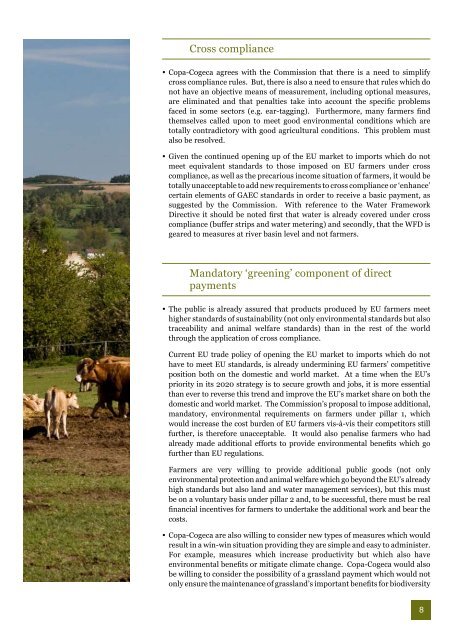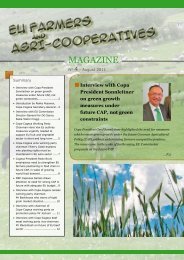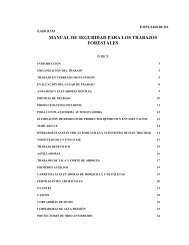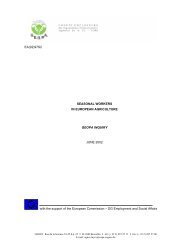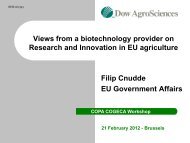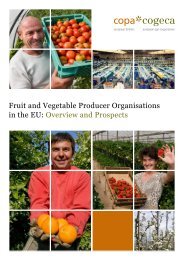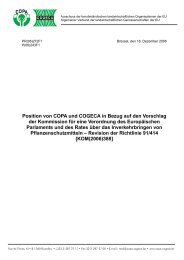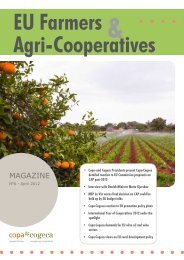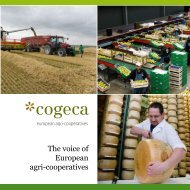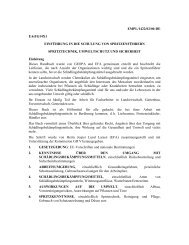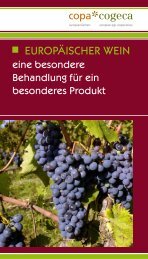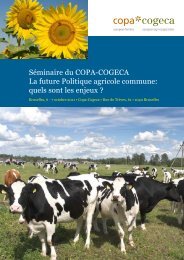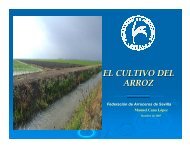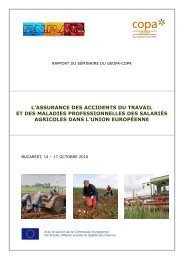The Future of the Common Agricultural Policy post ... - Copa-Cogeca
The Future of the Common Agricultural Policy post ... - Copa-Cogeca
The Future of the Common Agricultural Policy post ... - Copa-Cogeca
Create successful ePaper yourself
Turn your PDF publications into a flip-book with our unique Google optimized e-Paper software.
Cross compliance<br />
•y <strong>Copa</strong>-<strong>Cogeca</strong> agrees with <strong>the</strong> Commission that <strong>the</strong>re is a need to simplify<br />
cross compliance rules. But, <strong>the</strong>re is also a need to ensure that rules which do<br />
not have an objective means <strong>of</strong> measurement, including optional measures,<br />
are eliminated and that penalties take into account <strong>the</strong> specific problems<br />
faced in some sectors (e.g. ear-tagging). Fur<strong>the</strong>rmore, many farmers find<br />
<strong>the</strong>mselves called upon to meet good environmental conditions which are<br />
totally contradictory with good agricultural conditions. This problem must<br />
also be resolved.<br />
•y Given <strong>the</strong> continued opening up <strong>of</strong> <strong>the</strong> EU market to imports which do not<br />
meet equivalent standards to those imposed on EU farmers under cross<br />
compliance, as well as <strong>the</strong> precarious income situation <strong>of</strong> farmers, it would be<br />
totally unacceptable to add new requirements to cross compliance or ‘enhance’<br />
certain elements <strong>of</strong> GAEC standards in order to receive a basic payment, as<br />
suggested by <strong>the</strong> Commission. With reference to <strong>the</strong> Water Framework<br />
Directive it should be noted first that water is already covered under cross<br />
compliance (buffer strips and water metering) and secondly, that <strong>the</strong> WFD is<br />
geared to measures at river basin level and not farmers.<br />
Mandatory ‘greening’ component <strong>of</strong> direct<br />
payments<br />
•y <strong>The</strong> public is already assured that products produced by EU farmers meet<br />
higher standards <strong>of</strong> sustainability (not only environmental standards but also<br />
traceability and animal welfare standards) than in <strong>the</strong> rest <strong>of</strong> <strong>the</strong> world<br />
through <strong>the</strong> application <strong>of</strong> cross compliance.<br />
Current EU trade policy <strong>of</strong> opening <strong>the</strong> EU market to imports which do not<br />
have to meet EU standards, is already undermining EU farmers’ competitive<br />
position both on <strong>the</strong> domestic and world market. At a time when <strong>the</strong> EU’s<br />
priority in its 2020 strategy is to secure growth and jobs, it is more essential<br />
than ever to reverse this trend and improve <strong>the</strong> EU’s market share on both <strong>the</strong><br />
domestic and world market. <strong>The</strong> Commission’s proposal to impose additional,<br />
mandatory, environmental requirements on farmers under pillar 1, which<br />
would increase <strong>the</strong> cost burden <strong>of</strong> EU farmers vis-à-vis <strong>the</strong>ir competitors still<br />
fur<strong>the</strong>r, is <strong>the</strong>refore unacceptable. It would also penalise farmers who had<br />
already made additional efforts to provide environmental benefits which go<br />
fur<strong>the</strong>r than EU regulations.<br />
Farmers are very willing to provide additional public goods (not only<br />
environmental protection and animal welfare which go beyond <strong>the</strong> EU’s already<br />
high standards but also land and water management services), but this must<br />
be on a voluntary basis under pillar 2 and, to be successful, <strong>the</strong>re must be real<br />
financial incentives for farmers to undertake <strong>the</strong> additional work and bear <strong>the</strong><br />
costs.<br />
<strong>Copa</strong>-<strong>Cogeca</strong> are also willing to consider new types <strong>of</strong> measures which would<br />
•y<br />
result in a win-win situation providing <strong>the</strong>y are simple and easy to administer.<br />
For example, measures which increase productivity but which also have<br />
environmental benefits or mitigate climate change. <strong>Copa</strong>-<strong>Cogeca</strong> would also<br />
be willing to consider <strong>the</strong> possibility <strong>of</strong> a grassland payment which would not<br />
only ensure <strong>the</strong> maintenance <strong>of</strong> grassland’s important benefits for biodiversity<br />
8


